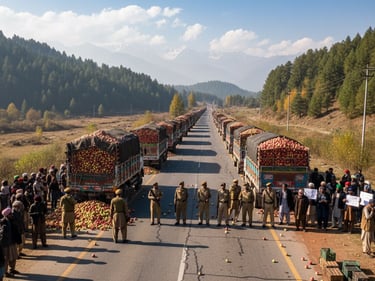Highway Blockade Turns Kashmir Apple Harvest into Rotting Losses, Farmers Cry Foul
Kashmir’s apple growers are facing devastating losses as trucks loaded with fresh produce remain stuck on a blocked highway. With apples rotting in crates, farmers say their hard work has “gone to waste,” highlighting the region’s fragile dependence on road connectivity for its lifeline crop.


By: Bharat Daily Samachar Date: 17 Sep,2025
Apples Rot as Roads Stay Shut
In the picturesque valleys of Kashmir, where the crisp autumn air usually signals a season of hope and profit, despair has taken over. The blockade of the Srinagar–Jammu National Highway, the only all-weather road that connects the Valley to the rest of India, has left truckloads of apples stranded. For farmers, this year’s harvest is rotting before it can reach markets, turning months of hard work into heartbreaking waste.
The image of crates overflowing with decaying fruit has become a stark reminder of how fragile the supply chain is in a region where road connectivity is the only lifeline.
Apples: The Heartbeat of Kashmir’s Economy
Apple cultivation is more than just farming in Kashmir—it is a way of life and the backbone of its rural economy. The region produces nearly 70% of India’s apples, contributing billions of rupees annually. For many families, the orchard is not just land but heritage, passed down through generations.
Every season, farmers invest heavily in fertilizers, pesticides, labor, and packaging, hoping that timely transport will bring returns. But this year, nature’s bounty lies trapped in crates, with no clear way out.
The Highway Blockade Crisis
The Srinagar–Jammu highway is notorious for landslides, heavy rains, and frequent closures. This season, continuous blockades caused by landslips and repair work have created unprecedented delays. Hundreds of trucks carrying perishable apples remain immobilized for days, with no cold storage facilities to protect the produce.
Farmers recount how apples, which should have been in Delhi or Mumbai markets within two days, are now rotting in trucks under the sun. Each lost crate represents not just money, but months of sweat, labor, and anticipation.
Farmers’ Voices of Despair
“We worked day and night to grow this crop, and now it is all going to waste,” says Ghulam Rasool, a farmer from Shopian, often called the ‘apple bowl’ of Kashmir. His words reflect the anguish of thousands of growers.
Many farmers have taken loans for fertilizers and packaging material, expecting repayment after sales. With their produce spoiled, they now face mounting debt and uncertainty. “How will we feed our families when our entire year’s income is rotting on the roadside?” asked another grower.
The sense of helplessness is evident across the valley. Social media has been flooded with images and videos of rotting apples, sparking outrage and demands for urgent government intervention.
Traders and Transporters Also Hit
It’s not just the farmers. Traders, commission agents, and transporters are also facing heavy losses. Truck drivers, forced to wait endlessly on the highway, complain of poor facilities and mounting expenses. “We are stuck for days without proper food or rest. Meanwhile, the goods we are carrying are perishing,” one driver lamented.
The ripple effect reaches big cities too, where fruit markets are reporting a sudden shortage and spiking prices. Consumers in Delhi, Mumbai, and other cities are paying more, while farmers in Kashmir earn nothing from their hard-earned produce.
Calls for Government Intervention
Growers’ associations have urged the government to step in with immediate relief measures. Demands include:
Quick clearance of stranded trucks.
Compensation for losses suffered by farmers.
Investment in cold storage chains and alternate routes to reduce dependence on a single highway.
Political leaders in the Valley have also criticized the administration for failing to ensure smooth passage during the crucial harvest season.
A Long-Term Problem
The crisis is not new. Every year, farmers face uncertainty due to highway disruptions, whether from snowfall, landslides, or political blockades. Yet little has been done to develop lasting solutions. Experts argue that building better infrastructure—such as rail connectivity, tunnel expansions, and cold storage hubs—could safeguard Kashmir’s agriculture from such recurring disasters.
Without such measures, each season remains a gamble, with farmers left at the mercy of the road and the weather.
Impact on Rural Livelihoods
Kashmir’s villages depend heavily on apple earnings. With this season’s losses, families face cutbacks on education, healthcare, and even basic needs. Young people who once saw hope in orchard-based livelihoods are now questioning whether farming can sustain them.
“If this continues, our children will leave farming altogether. Who would want to invest so much effort just to watch it all rot?” says Bashir Ahmad, another orchard owner.
Apples as a Symbol of Hope
For generations, apples have been Kashmir’s pride, known for their crisp sweetness and global appeal. They symbolize both the resilience and beauty of the Valley. Yet, as growers watch their produce decay on the roadside, the fruit of hope has turned into a bitter reminder of systemic neglect.
Conclusion: A Rotten Deal for Farmers
The sight of rotting apples on Kashmir’s highways is not just about lost fruit—it is about lost livelihoods, lost dignity, and lost opportunities. Until structural issues in infrastructure and governance are addressed, such tragedies will continue to haunt the Valley’s apple growers.
For now, what should have been a season of prosperity has turned into one of despair, leaving farmers with the painful realization that their hard work has, quite literally, gone to waste.
